
September 11
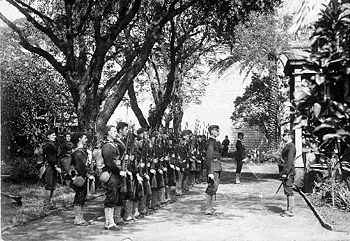
1897 The 1897 Petition Against the Annexation of Hawaii by the Hawaiian Patriotic League, composed of native Hawaiians, is presented to the US Congress.
[See: Countdown to Infamy: Pearl Harbor.]1914 List Regiment (Sep 1-Oct 7):
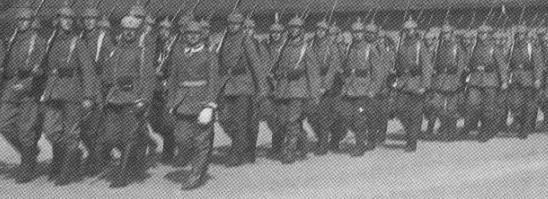
Infantry Recruit Adolf Hitler's regiment continues a short but intensive basic training program, which is held in the premises of a large public school on the Elizabeth Platz in Munich. Hitler wears the first uniform of his life; basic greenish-grey with an "RIR 16" sown in red unto the epaulettes and a red stripe down the side of the trousers. The trousers are tucked into new leather boots, topped by a thick leather belt around the waist of the uniform jacket. [For further details, Click here.]
1915 World War I: Zimmerwald Conference issues a call for immediate peace:
On September 11, 1915, at Zimmerwald in Switzerland, delegates to the First International Socialist Conference call for an immediate end to the First World War.
Even as battle dragged on in the trenches of the Western Front and the war in the air intensified with increased German air strikes on London and its environs, a group of dedicated anti-war activists and committed socialists gathered in neutral Switzerland from September 5 to 11, 1915, as the First International Socialist Conference. Formally assembled by the Swiss and Italian Socialist parties, the conference included some 40 delegates from 11 countries, including Russia, Poland, France, Germany, Bulgaria, Romania, Italy, Switzerland, the Netherlands, Sweden and Norway. Among the more prominent attendees were Vladimir Lenin, exiled leader of the radical socialist Bolshevik Party; Leon Trotsky, Lenin's former political rival and future second-in-command; and Karl Liebknecht, an elected representative to the German Reichstag government who would later break from the Social Democratic party to found the Bolshevik-inspired Spartacist movement with Rosa Luxemburg.
According to the conference's manifesto, "the war which has produced this chaos is the outcome of imperialism, of the attempt, on the part of the capitalist classes of each nation, to foster their greed for profit by the exploitation of human labor and of the natural treasures of the entire globe." In order to force an immediate end to the war, the conference insisted, workers within each country should try by any means necessary to convert the current capitalist struggle into a more enlightened one: an international workers' revolution or civil war "between the classes" that would spread throughout Europe, and eventually the world.
Two years later, with revolution in full swing in Russia and Czar Nicholas II off the throne, Lenin returned to Russia from exile, smuggled in with the help of the Germans, to carry out what he saw as the first step in fulfilling the resolution decided upon at the Zimmerwald Conference. After seizing control of Russia from the provisional government, he and Trotsky consolidated power for the Bolsheviks, declaring an immediate armistice with the Central Powers and pulling Russia out of World War I by the end of 1917. (History.com)
1915 World War I: List Regiment:

Gefreiter Adolf Hitler's 16 Reserve Infantry Regiment continues to occupy a position, at Fromelles—pictured above in a drawing by Hitler—on a level field with water channels, willow trees and willow stalks. In the distance towards the enemy lines lies an insignificant wood with barbed wire entanglements. Under the direction of their defense-minded commander, Lieutenant General Gustav Scanzoni von Lichtenfels, the regiment works ceaselessly day and night to further fortify their position at Fromelles while fighting off repeated assaults by the enemy. [For further details, Click here.]
1916 World War I: Various:
New Britain invaded by Australia; German contingent there defeated.
List Regiment:
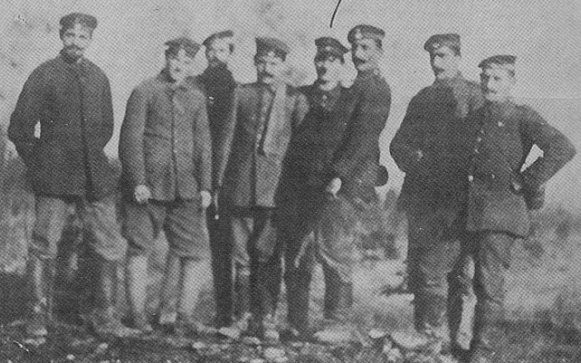
Hitler and his fellow dispatch runners
Gefreiter Adolf Hitler endures trench warfare in Flanders (Artois) with 3 Company, 16 Reserve Infantry Regiment.. [For further details, Click here.]
1917 World War I (September 8-11):

The List Regiment is taken off the front by train for a two month rest. [For further details, Click here.]
1918 World War I (August 21-September 27):
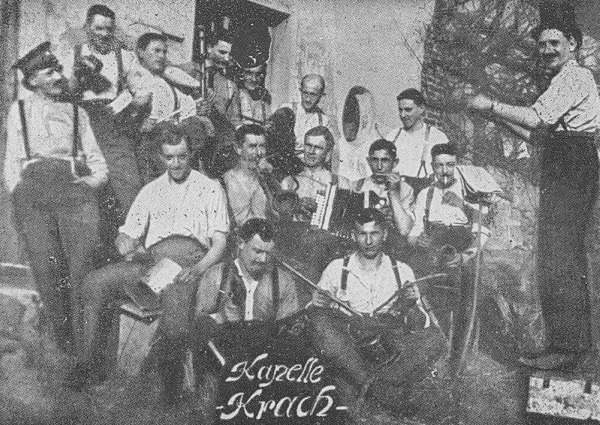
Gefreiter Adolf Hitler attends a signals training course in Nuremberg. [For further details, Click here.]
1924 Birth: Rudolf Vrba: Professor of pharmacology and therapeutics, specializing in neurology, who became known internationally for more than 50 research papers on the chemistry of the brain and for his work on diabetes and cancer. He is chiefly known, however, for being the second of only five Jews to both escape successfully from the Auschwitz concentration camp and pass information to the Allies about the mass murder that was taking place there during the Holocaust. The 32 pages of information that he and fellow escapee Alfred Wetzler dictated to horrified Jewish officials in Slovakia in April 1944 became known as the Vrba-Wetzler Report. It is regarded as one of the most important documents of the 20th century because it was the first detailed information about the camp to reach the Allies that they accepted as credible. Although the report's release to the public was controversially delayed until after the mass transport of 437,000 Jews from Hungary to Auschwitz had begun on May 15, 1944, it is nevertheless credited with having saved many lives.
1933 Hungary prohibits the use or display of the swastika by private citizens or organizations.
1935 Various:
Synthetic rubber (Buna): Hitler, at the Seventh Nazi Party Congress in Nuremberg, announces that German scientists have solved the problem of synthetic rubber production. The goal of the re-organization of the economy was to achieve German self-sufficiency.
League of Nations: Britain urges the League to resist aggressive actions. (THP)
1937 From a speech by Reichsleiter Ley to the fifth annual session of the German Labor Front:
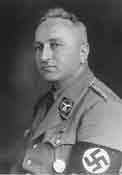
Once I said to the Fuehrer: "My Fuehrer, actually I am standing with one foot in jail, for today I am still the trustee of the comrades Leipart and Imbusch; and should they someday ask me to return their money, then it will be found that I have put it into buildings or otherwise spent it. But they shall never again find their property in the condition in which they handed it over to me. Therefore I should have to be convicted." The Fuehrer laughed then and remarked that apparently I felt extremely well in this condition. It was very difficult for us all. Today we laugh about it.
1940 Various:

Joseph Goebbels speaks to the Czechs: on The Coming Europe: "When England falls, we will have the chance to reorganize Europe in a way that befits the social, economic, and technical possibilities of the twentieth century."
Hitler focuses East, sends troops to Romania:
On this day in 1940, Adolf Hitler sends German army and air force reinforcements to Romania to protect precious oil reserves and to prepare an Eastern European base of operations for further assaults against the Soviet Union.
As early as 1937, Romania had come under control of a fascist government that bore great resemblance to that of Germany's, including similar anti-Jewish laws. Romania's king, Carol II, dissolved the government a year later because of a failing economy and installed Romania's Orthodox Patriarch as prime minister. But the Patriarch's death and peasant uprising provoked renewed agitation by the fascist Iron Guard paramilitary organization, which sought to impose order. In June 1940, the Soviet Union co-opted two Romanian provinces, and the king searched for an ally to help protect it and appease the far right within its own borders. So on July 5, 1940, Romania allied itself with Nazi Germany—only to be invaded by its "ally" as part of Hitler's strategy to create one huge eastern front against the Soviet Union.
King Carol abdicated on September 6, 1940, leaving the country in the control of the fascist Prime Minister Ion Antonescu and the Iron Guard. While Romania would recapture the territory lost to the Soviet Union when the Germans invaded Russia, it would also have to endure the Germans' raping its resources as part of the Nazi war effort. Besides taking control of Romania's oil wells and oil installations, Hitler would help himself to Romania's food crops—causing a food shortage for native Romanians. (History.com)
1941 Various:

Attack on USS Greer: President Franklin D. Roosevelt gives orders to attack any German or Italian vessels found US defensive waters. Note: The US has not officially entered World War II at this time. Fireside Chat:
The Navy Department of the United States has reported to me that on the morning of September fourth the United States Destroyer Greer, proceeding in full daylight toward Iceland, had reached a point southeast of Greenland. She was carrying American mail to Iceland. She was flying the American flag. Her identity as an American ship was unmistakable. She was then and there attacked by a submarine. Germany admits that it was a German submarine. The submarine deliberately fired a torpedo at the Greer, followed later by another torpedo attack. In spite of what Hitler's propaganda bureau has invented, and in spite of what any American obstructionist organization may prefer to believe, I tell you the blunt fact that the German submarine fired first upon this American destroyer without warning, and with deliberate design to sink her.
Charles Lindbergh speaks in Des Moines, Iowa to an audience of 7,500.
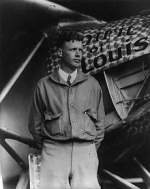
National polls showed that when England and France declared war on Germany, in 1939, less than 10 percent of our population favored a similar course for America. But there were various groups of people, here and abroad, whose interests and beliefs necessitated the involvement of the United States in the war. I shall point out some of these groups tonight, and outline their methods of procedure. In doing this, I must speak with the utmost frankness, for in order to counteract their efforts, we must know exactly who they are. The three most important groups who have been pressing this country toward war are the British, the Jewish and the Roosevelt administration. Behind these groups, but of lesser importance, are a number of capitalists, Anglophiles, and intellectuals who believe that the future of mankind depends upon the domination of the British empire. Add to these the Communistic groups who were opposed to intervention until a few weeks ago, and I believe I have named the major war agitators.
Holocaust: Niederhagen, the concentration camp for Wewelsburg castle, becomes independent:
In September 1941 when the camp became independent as Niederhagen concentration camp 480 prisoners were interned. Since 1941 more and more prisoners from foreign countries were interned in the camp. The approximately 3,900 prisoners included Jehovah's Witnesses, political prisoners, Sinti and Romani people, Yeniche, homosexuals, Jews, prisoners of war and forced laborers from Poland, the Soviet Union (also prisoners of war), Czechoslovakia, France, the Netherlands and Belgium. Almost a third of them didn't survive the imprisonment. Proved is the death of 1,285 prisoners. They died of hunger, cold, disease and the consequences of ill-treatment. In 1942 a camp-intern crematorium was built. The Gestapo used the camp also as a place for executions. By the command of Heinrich Himmler a total of 56 people, including women and children, from Westphalia-Lippe were executed. In the period from 1 September 1941 to 1 May 1943 camp was independent. Previously, it was under control of the Sachsenhausen concentration camp, then of the Buchenwald concentration camp.

Church and Reich: Adolf Hitler tells Franz von Papen that he is upset about the continuing confiscations of Church property, and blames the hotheads of the Party for "this nonsense." (THP)
Arlington, VA: the groundbreaking ceremony for the Pentagon takes place.
1942 Various:
Bund deutscher Offiziere: an anti-Hitler association of German officers captured by the Red Army is formed.
Duesseldorf: Heavy RAF raid on the city.
[See: What Were Adolf Hitler's Major Blunders?]Holocaust Resistance: Meir Berliner, a young Jew from Argentina trapped in Warsaw by the war, uses his penknife to stab an SS officer to death at Treblinka.
Meir Berliner had arrived in Treblinka from Warsaw a few days before in one of the transports of the "big Aktion." At that time it was the practice to take out several hundred people from each transport to work arranging the belongings of the murdered; the same day or a few days later, the group was liquidated and was replaced by other people selected from new shipments. At the evening roll-call of the prisoners, Max Bialas instructed those who had arrived that same day to line up on the side. It was not clear who was to be liquidated: the new arrivals or those who had arrived earlier. At that moment Berliner jumped out from the ranks of the prisoners, lurched toward Bialas and stabbed him with a knife. A great commotion followed. The Ukrainian guards opened fire. Berliner was killed on the spot. and in the course of the shooting more than ten other prisoners were killed and others were wounded. When the tumult subsided the prisoners were lined up again for roll-call. Christian Wirth, who was in Treblinka at the time, arrived on the scene accompanied by Kurt Franz, the second in command of the camp. Ten men were removed from the ranks and shot on the spot in full view of all the others. On the following day, during the morning roll-call, another 150 men were taken out, brought to the Lazarett and shot there. Max Bialas died en route to the military hospital.
1943 Various:
Italy: British 8th Army occupies Brindisi in southern Italy. Between now and February 1944 the city will function as the temporary capital of Italy.
Torture: From a letter sent by Dr. Gomet, Secretary of the Council of the Departmental College of Doubs of the National Order of Physicians to the chief medical officer of the Feldkommandantur in Besancon:
Dear Doctor and Colleague, I have the honor to deliver to you the note which I drafted at your request and sent to our colleagues of the department in a circular of 1 September. My conscience compels me on the other hand, to take up another subject with you. Quite recently I had to treat a Frenchman who had wounds and multiple ecchymosis on his face and body, as a result of the torture apparatus employed by the German security service. He is a man of good standing, holding an important appointment under the French Government; and he was arrested because they thought he could furnish certain information. They could make no accusation against him, as is proved by the fact that he was freed in a few days, when the interrogation to which they wanted to subject him was finished. He was subjected to torture, not as a legal penalty or in legitimate defense; but for the sole purpose of forcing him to speak under stress of violence and pain. As for myself, representing the French medical body here, my conscience and a strict conception of my duty compel me to inform you of what I have observed in the exercise of my profession. I appeal to your conscience as a doctor and ask you whether by virtue of our mission of protecting the physical health of our fellow beings, which is the mission of every doctor, it is not our duty to intervene.
Holocaust: Danish sea captains and fishermen, on the eve of the Jewish deportations, ferry 5,919 Jews, 1,301 part-Jews, and 686 Christians married to Jews to safety in Sweden (See October 1). [This was a gallant act on the part of the Danes but, also, the generosity of Sweden in taking in the Jews should not be forgotten.—Ed.]
1944 Various:
Darmstadt: RAF bombing raid and the following firestorm kill 11,500.
I was a Hitler Youth messenger. As such, I was stationed at an air raid shelter bunker built both above ground and underground. When an air raid alarm sounded, we had to be there on time and open the bunker with the "block leader", a party official who was responsible for the street. We had to care for the children, give them milk, and so on, if the alarm lasted a long time. . . . . The block leader or the women from the Nazis' women's organization sent around and handed out toys to the children and light sedatives to the adults. And the louder the attack got outside, the quieter it got in the bunker.
France: The American Seventh Army joins up with the US Third Army near Dijon.
Over the border: The first allied troops of the US Army cross the western border of Nazi Germany.
1945 Far East: The Japanese-run camp at Batu Lintang, Sarawak, in Borneo is liberated by the Australian 9th Division, averting the planned massacre of its 2,000-plus Allied POWs and civilian internees.[For further information, click here.]
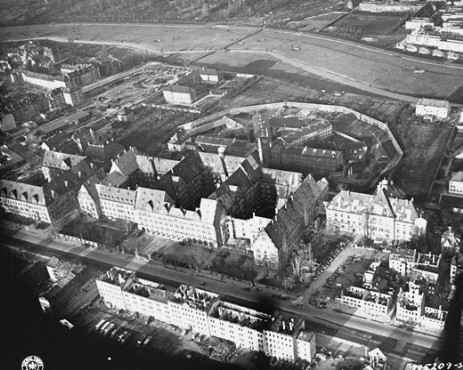
1946 Nuremberg Tribunal: The justices meet to discuss verdicts in the Major War Criminals Trial. (See: 30 September 1946)
1971 Death: Nikita Khrushchev: Former Soviet leader Nikita Khrushchev, one of the most significant figures of the Cold War and certainly one of the most colorful, dies. During the height of his power in the late 1950s and early 1960s, Khrushchev was involved in some of the most important events of the Cold War. [For further details, Click here]
2001 Attack on America:
At 8:45 a.m. on a clear Tuesday morning, an American Airlines Boeing 767 loaded with 20,000 gallons of jet fuel crashes into the north tower of the World Trade Center in New York City. The impact left a gaping, burning hole near the 80th floor of the 110-story skyscraper, instantly killing hundreds of people and trapping hundreds more in higher floors. As the evacuation of the tower and its twin got underway, television cameras broadcasted live images of what initially appeared to be a freak accident. Then, 18 minutes after the first plane hit, a second Boeing 767--United Airlines Flight 175--appeared out of the sky, turned sharply toward the World Trade Center, and sliced into the south tower at about the 60th floor. The collision caused a massive explosion that showered burning debris over surrounding buildings and the streets below. America was under attack. [For further information, click here]
2006 Death: Joachim Fest: German historian, journalist, critic and editor, is best known for his writings and public commentary on Nazi Germany, including an important biography of and books whose subjects included Adolf Hitler, Albert Speer, and the German Resistance. He was a leading figure in debate among German historians about the Nazi period.
Edited by Levi Bookin (Copy editor)
levi.bookin@gmail.com



Click to join 3rdReichStudies



Disclaimer: This site includes diverse and controversial materials--such as excerpts from the writings of racists and anti-Semites--so that its readers can learn the nature and extent of hate and anti-Semitic discourse. It is our sincere belief that only the informed citizen can prevail over the ignorance of Racialist "thought." Far from approving these writings, this site condemns racism in all of its forms and manifestations.
Fair Use Notice: This site may contain copyrighted material the use of which has not always been specifically authorized by the copyright owner. We are making such material available in our efforts to advance understanding of historical, political, human rights, economic, democracy, scientific, environmental, and social justice issues, etc. We believe this constitutes a "fair use" of any such copyrighted material as provided for in section 107 of the US Copyright Law. In accordance with Title 17 U.S.C. Section 107, the material on this site is distributed without profit to those who have expressed a prior interest in receiving the included information for research and educational purposes. If you wish to use copyrighted material from this site for purposes of your own that go beyond 'fair use', you must obtain permission from the copyright owner.
Please Note: The list-owner and moderators of 3rdReichStudies are not responsible for, and do not necessarily approve of, the random ads placed on our pages by our web server. They are, unfortunately, the price one pays for a 'free' website.